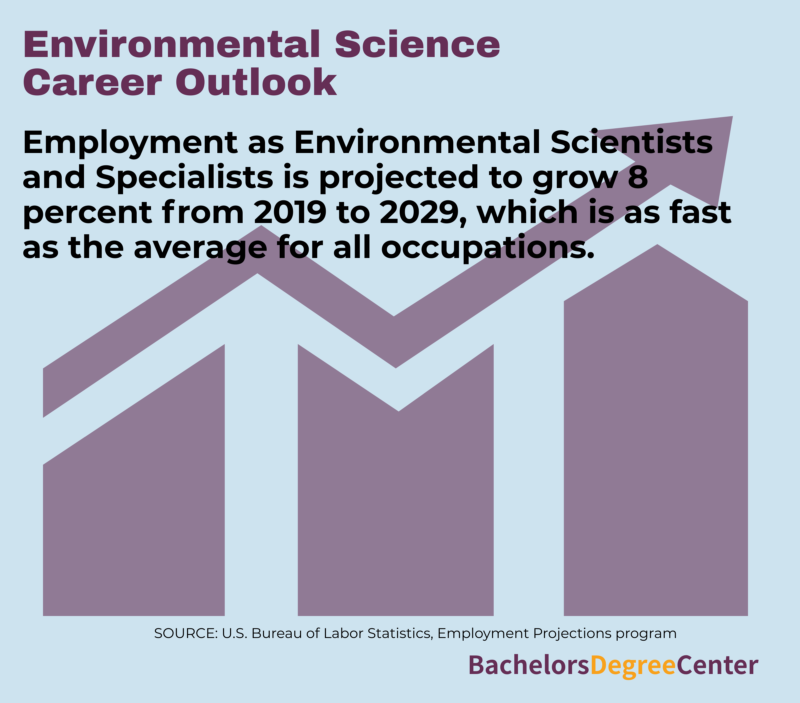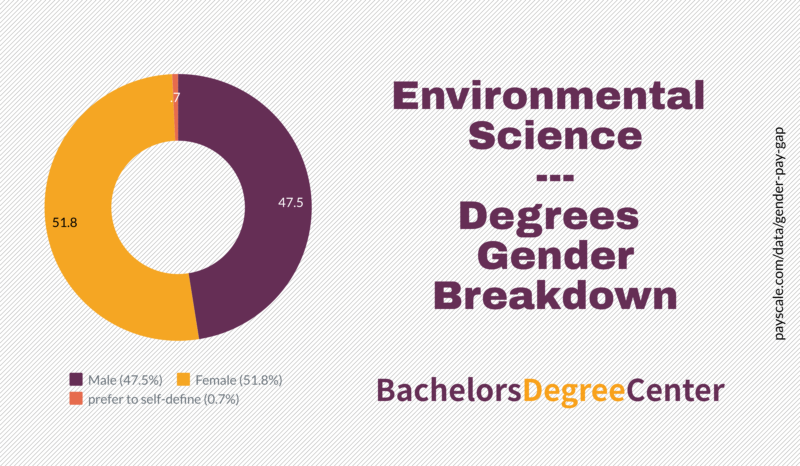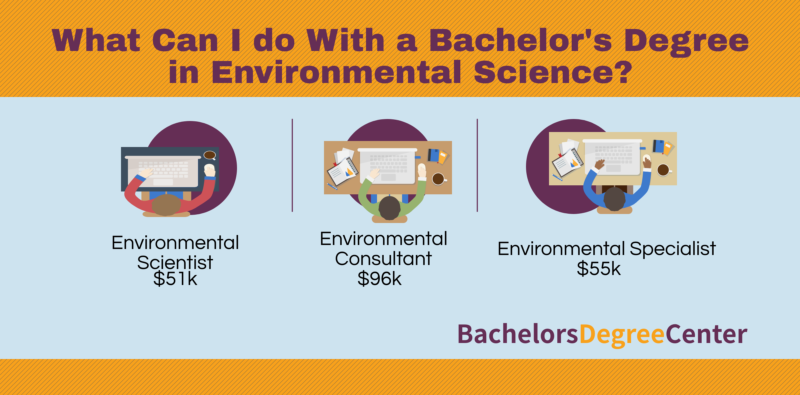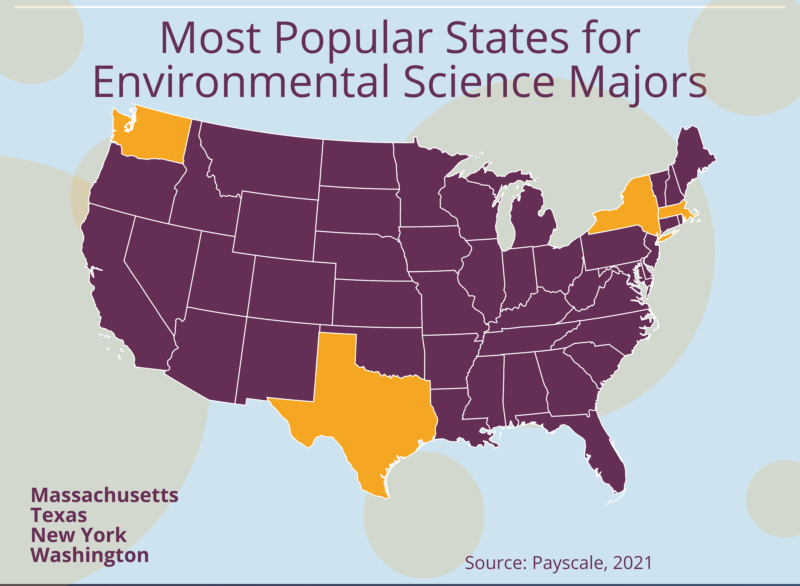Environmental studies are much more than simply studying the environment. It also includes managing vital natural resources and exploring sustainable sources of energy. Those who have a passion for taking care of our planet will sometimes choose environmental studies or environmental science degree programs because it provides them with the skills they need to make positive changes to the natural world around us.
Students who have taken entry-level jobs often choose to return to school to further their careers. In the past, having to attend school on campus could cost them their job. With the introduction of online learning platforms, students can now opt for online degree programs that offer flexible schedules and a level of convenience that is unsurpassed. Students can continue to support their families and, at the same time, get the education they need to apply for promotions and positions with more responsibilities and higher pay. Are you asking yourself “What can i do with an environmental science degree”? Keep reading.

What Is the Difference Between Environmental Studies vs Environmental Science?
Environmental sciences involve studying the core fundamental sciences. This includes physics, math, biology, chemistry, earth science, atmospheric science, and geology. Environmental science is essential when it comes to understanding how things within nature function and how the environment is affected by other elements in our world. This includes determining how a carbon footprint is determined and the effect it has on our future.
Environmental studies, on the other hand, involve understanding social sciences and how they impact our natural environment. Students cover environmental issues like climate change, ecology, environmental health, environmental protection, environmental education, and other environmental problems. How we use the natural resources we have available to us is part of this equation. This type of degree program also involves more efficient ways to use our natural resources and how to prevent their depletion. Sustainable forms of energy are available and can be effectively used to meet our needs.
Is a Degree in Environmental Science Worth It?
The value that is placed on an online environmental science degree can be determined by the time and money you put into earning it, or, it can be determined by what you do with it. When it comes to the financial cost, you can make a degree more affordable by applying for scholarships and grants that can be used to cover the cost of your education. When it comes to the time you spend, you do have options. If you choose an online environmental science degree program, you can make the most of the flexible schedule by finding a job in your chosen career field.
One of the best ways to determine the value of an online environmental science degree is how you use it. You get the most value out of a degree that you use to make positive, and in this instance, powerful changes in how we impact our environment. This can be through helping to correct the damage we have already caused or working to prevent future damage. Preventing future damage or reducing our carbon footprint, involves many different concepts, including effectively managing our natural resources. Managing our sustainable resources is also important.
What Industries Use Environmental Science Degrees?
In some way or another, almost every industry must deal with environmental science. Disposal of waste, energy usage, and the overall operation of the business will all have an impact on the environment. An environmental science degree can be used to evaluate a company’s ability to maintain energy-efficient practices. Individuals who take the time to earn an environmental science degree may not find work in one particular industry. Instead, they may be able to pursue a career as an independent consultant who works with companies in many different industries.
Being able to look at each company’s best practices when it comes to environmental management can be extremely beneficial. The company is able to refine its business practices to use more efficient methods and save money on energy costs. The independent environmental consultant is not tied down to one industry but instead can work with several. This makes their job interesting and will also give them job security since they will work with each company for short periods of time.
Is an Online Environmental Science Degree Just as Good as One Earned in a Classroom?
Many students are concerned that employers may prefer a degree earned in a classroom is more beneficial than one earned online. The fact is, more employers than ever before, are encouraging their employees to pursue their degrees online. Part of the reason for this is that it will allow the employee to remain on the job while they are taking their classes. If the student is working in a field where environmental science is essential, this ensures the employer will be able to offer more responsibility to the student over time.
The fact is, universities and colleges offer the same degree programs they teach in their classrooms to students who enroll in their online classes. Most schools also offer the same type of resources as well. Schools have also started to offer accelerated degree programs online so that students can complete their education in a much shorter period of time. In some cases, the time it takes to complete a degree program can be shortened to 18 months to two years, depending on the program the student is enrolled in.
School and Program Accreditation
Accreditation is extremely valuable when discussing environmental science degree programs. It is important that students know that the degree program they choose will provide them with a quality education. Accreditation is a way for industry professionals to validate the effectiveness of either the school or the degree program in question. Ensuring that a school or degree program offers the most accurate information possible is essential if students can expect to succeed.
There are two types of accreditation. Regional accreditation is given to schools that meet strict requirements. Specialized accreditation is used to evaluate degree programs. Neither type of accreditation is permanent. They both must be reviewed following a strict renewal schedule that is used to maintain the integrity of the review process and ensure schools and programs are consistently in compliance.
What is Regional Accreditation?
Regional accreditation is what is given to colleges and universities that are able to prove they meet the standards of education that are required by each industry. Every industry has specific standards that must be met by schools of higher learning if they are to achieve accredited status. In order to be accredited, schools must perform a self-evaluation to determine whether or not they are eligible for the award. Receiving accredited status is an ongoing process and must be renewed regularly. An accredited online environmental science degree is able to provide you with the highest quality education possible.
What is Specialized Accreditation?
Specialized accreditation is what is given to degree programs that fulfill all of the educational requirements an industry has in place for graduates who earn their degrees. Much like regional accreditation, specialized accreditation ensures that a student receives the quality education that is required for them to succeed. Specialized accreditation must be renewed periodically so that it isn’t allowed to lapse. Environmental science degree programs that have earned accredited status offer students the best chance at earning the highest pay and receiving the best opportunities for advancement.
What Are the Best Colleges for Environmental Science Degrees?
The best colleges for environmental science degrees are those that provide you with the tools you will need to be successful. This will mean different things to different students. Many people believe that the best schools and degree programs are those that have earned accredited status. That is true in many situations, but it is important to remember that there are many environmental science degree programs that are not accredited but are still capable of providing the level of education that will guarantee your success. If you have questions about accreditation, your academic advisor can provide you with the answers you need.
Do Employers Look for Students with an Accredited Online Environmental Science Degree?
While it’s true that employers look for students who have earned an accredited environmental science degree, they also know that each student has the ability to make the most of their education, accredited or not. An accredited online environmental science degree gives students the advantage they need to succeed. Employers realize, however, that it’s the student’s drive and ambition that will push them past the limits of their education and allow them to begin working on their careers.

Types of Environmental Science Degrees
There are many types of environmental science degrees. Earning a Bachelor’s degree is one of the best ways to kick off a career in the environmental science field. There are many schools that have done away with the traditional Associate’s degree, combining the basic courses with those included in the online Environmental Science Bachelor’s degree programs. This gives students the same basic education in a much shorter period of time, allowing them to build their careers and gain experience. An online degree makes it easier for the student to move forward due to the incredibly flexible schedule and easy-to-use online learning platform.
What Can I Do with a Bachelor’s Degree in Environmental Studies?
There are several career options for graduates who have earned a Bachelor’s degree in environmental studies online. Environmental scientist, geoscientist, conservation officer, and an environmental engineer are all possible career options. Students who are interested in working with the environment can start by finding employment in areas like the Department of Natural Resources or a recycling plant. Working in an environmental field gives you a headstart on your education and allows you to explore the many different career options you have available to you.
What Is the Difference Between a BA and a BS Degree?
A Bachelor of the Arts (BA) is actually quite different than a Bachelor of Science (BS) degree. A Bachelor of the Arts degree focuses on the philosophy and the humanitarian aspect of an environmental science degree. This means studying why humans do what they do when it comes to the environment. Becoming a “throwaway” society where everything is easily replaceable has had a devastating impact on the environment. With a Bachelor of Science degree, the educational focus falls on the core classes that are used to lay an educational foundation. Biology, math, science, and English are just a few of the most common.
What Specializations Are Available in an Environmental Studies Degree Program?
There are many specializations that environmental science majors can choose from. An environmental scientist or engineer works to maintain the environment in its most natural state. This can mean helping a company find the safest, most environmentally-friendly way for a company to complete a project or repair damage it may have caused the environment over time. Environmental managers are able to research and maintain sustainable forms of energy and, in turn, making those forms of energy easily accessible to consumers. Conservation officers also involve an environmental specialization. Conservation officers work to protect the environment, making it possible for residents to explore nature and still keep it as pristine as possible. Many students in environmental science programs will take on internships to get in the door of environmental science jobs. While you may learn to conduct research in your program, internships help you practice the communication skills and other soft skills you’ll need in the workplace.
Certifications and Licenses
You don’t necessarily have to get a master’s degree to get higher jobs and pay. Certifications and licenses are good ways to validate your experience in your general area of expertise. When a person completes their education, they have their degree to rely on. Individuals who have worked in the environmental industry for many years will only have their experience and the skills they earned while on the job. They can take the knowledge they have gained through experience and complete a certification course that will give them the credentials they need to apply for advanced positions within their company. A certification program is also beneficial if the person is between degree programs and wants to update their skills. Licenses give an employee the validation they may need to get an insurance bond.
What Can I Do with an Environmental Science Certificate?
An environmental science certificate will validate the years of experience you have earned while being on the job. Certification programs can be completed in six months to a year, depending on the school and how advanced the curriculum is. An environmental science certificate is the best way to, not only validate, the skills you already have or upgrade them, allowing you to take advantage of all the latest possible information. With an environmental science degree, you can advance your career at your own pace and take advantage of any new opportunity that comes your way. With the right certification, you can advance your education as well as your career.

Are There Different Types of Environmental Science Certifications?
There are many different types of environmental science certifications that will allow a student to perform in a variety of capacities. Environmental managers and compliance officers work to effectively manage and regulate the use of valuable natural resources. ISO and EMAS certifications are also options that will allow you to expand on your career and start exploring new opportunities. Carbon Trust Standards and Forest Stewardship are great options for students who want to help protect the environment and teach others what can be done to prevent future types of damage.
Careers in Environmental Science
So what can you do with an environmental science degree? Careers in environmental science can be extremely lucrative. Depending on what type of career you choose, you can work to maintain the environment, protect it from abuse, explore new types of sustainable energy and even look for ways to make better use of the natural resources we so often take advantage of. A career in environmental science is a great way for individuals to be able to work out in nature and explore their world at the same time. Environmental engineers can find work in many different industries and will even allow graduates to become independent consultants, setting their own hours.
Experts in environmental studies work in career paths like environmental law and environmental policy, and work in places like the federal government, state government agencies, nonprofit organizations, the private sector, and more. Agencies include the Environmental Protection Agency. They work on projects like protecting habitats, forestry, natural resource management, water resources, waste management, and ecosystem protection. An environmental lawyer works to influence policymakers and Through the use of environmental studies, we can begin to understand how to protect our planet by changing our own habits.
Environmental science careers include public health, ecologist, meteorologist, and more. They may conduct environmental research on air quality, water quality,
What Jobs Are Available with an Environmental Science Degree?
If you’re wondering what to do with an environmental science degree, you can apply for many different jobs with an environmental science degree. Environmental management, environmental scientists, and geoscientists are all possible options for environmental science bachelor degree jobs. This type of degree gives you the information and skills you need to work as a consultant, helping all types of industries live in harmony with the world around them. Earning an environmental science degree also offers the managerial skills that are needed for natural park managers and conservation officers to effectively manage and care for the lands they are responsible for.
What Jobs Can I Get with a Certificate in Environmental Science?
A certificate in environmental science can accomplish several things. For someone who is working in an entry-level position within a natural park or state recreational area, earning a certificate in environmental science is the best way to move up to the next step. The certificate will help you build on the skills you learn while working. Certifications are also available for individuals who want to work as an EMA or an environmental safety compliance officer. The job opportunities are only limited by the boundaries you set for yourself.
Environmental Science Degree Salary
The salary you earn as an environmental professional can range greatly depending on your skills, education, and the extent of your education. Skills can be earned in many ways. Students who are enrolled in online classes may be able to take advantage of mentorship opportunities that come available at state parks or national recreational areas. The more experience you have, the higher your bachelors in environmental science salary.
The fact that an environmental science degree can be used in many ways ensures that you will be able to pursue your choice of career. You can find work in national parks, large corporations, or as an independent consultant who helps companies minimize their carbon footprint and run their business more efficiently.
What Is the Average Salary for an Environmental Science Degree Graduate?
Graduates who have earned an environmental science degree can expect to earn around $75,000 per year on average, according to the Bureau of Labor Statistics. Individuals with little experience or who are just starting school can start out making $35,000 to $40,000 per year. Graduates who have both the education as well as the much-needed experience can make close to $80,000 or more each year on average. Environmental managers will make more when they are able to assist with improving sustainable energy sources. It is up to you to take advantage of every possible opportunity.
How Can I Boost My Earning Potential?
The best way for you to boost your earning potential is to first find a job in your chosen career field. The next step, as you start to gain experience, is to enroll in a certification or environmental science degree program that will provide you with the training and skills you need to overcome obstacles and move your career forward. Once you have the experience and the education, then it’s up to you to start pursuing the opportunities that come your way. Many of these opportunities may be from within your own company. Others may be from other companies that have heard about the work you do. Either way, it is up to you to pursue each opportunity.

Professional Organizations
Graduates with a degree in environmental science can find support in many organizations that are dedicated to careers in the environmental science field.
The Association for Environmental Professionals
The Association for Environmental Professionals offers graduates an opportunity to work alongside other environmental professionals. They have access to advice and valuable resources they can rely on when they face difficult situations. Belonging to this association is a great way to look for new challenges and overcome obstacles you may run into.
Ecological Society of America
The Ecological Society of America is committed to working with environmental professionals who are working for the betterment of the plant. Finding ecological balance is the primary goal of this organization and the many professionals they work with.
Society for Conservation Biology
The Society for Conservation Biology brings together experienced professionals and recent graduates who can learn from one another on many different topics. In the study of biology, understanding how things within the environment work. Society encourages everyone to work together to bring about a healthier, much more eco-friendly environment.
Related Rankings:
25 Best Bachelor’s in Environmental Science
15 Best Online Bachelor’s in Environmental Science
10 Fastest Online Bachelor’s in Environmental Science
10 Most Affordable Bachelor’s in Environmental Science
